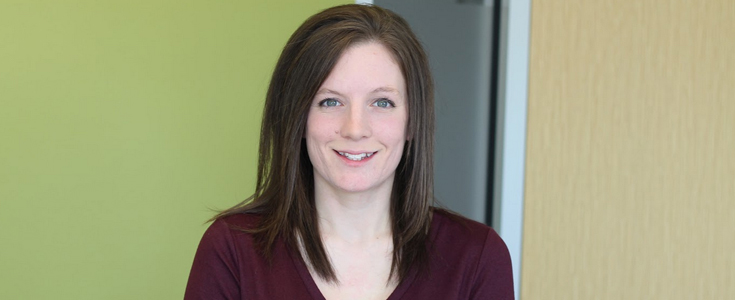Nurses maintain motivation in changing health-care system
Grace Hospital nurse Julie Miller has been on the front lines of health-care system changes aimed at providing the right care, in the right place, at the right time. But her overall goal, and that of her colleagues, has remained the same.
"Even with all of the systemic changes taking place in the health-care system, patient safety remains our number one priority," Miller says. "It's very important that we all work together to ensure everyone is getting the care they need, and that it's being done safely and efficiently. Our role is to help get people back home where they want to be."
Now entering her eighth year at the Grace Hospital, Miller is one of three professionals on her floor filling a newly created role as clinical resource nurse (CRN).
"The role is fairly new to the medicine program," Miller says. "Part of my role is to provide leadership to staff and to ensure we are following clinical practices and guidelines. I also act as the liaison between staff, physicians, and the unit manager to make sure clinical orders are being completed and patients are receiving optimal care. In the long term, I see the role turning into something where nurses come up to me whenever they have difficulties with a new procedure or they want someone to coach them through something. I see it as a pivotal role in managing the flow and getting patients the care they deserve."
Teamwork remains critical to success, she says.
"We are a clinical teaching unit, so we have nurses, medical students and residents, attending physicians, and specialists such as home-care coordinators, physiotherapists, occupational therapists—all the specialties needed to help a patient return to their health baseline. Because we're all busy with respect to the activities involved in our own disciplines, we need to take the time to meet together and make sure that everyone is doing what's required. Communication is the biggest key to success. Without it, things may be missed and not get done."
Grace Hospital is one of the three fully-acute hospitals (the others being Health Sciences Centre Winnipeg and St. Boniface Hospital) where emergency and acute services are being consolidated to enhance 24-7 access to specialist care and diagnostic services.
"The advantage to patients is that by concentrating on acute care, we're more quickly getting them back home, where they want to be, supported with resources," Miller says. "Those who are waiting in emergency for a room don't have to wait as long, and that's an advantage for them."
The challenge, she says, comes from staff and patients getting accustomed to Grace Hospital's new focus on acute care.
"The biggest change from when I started eight years ago is that people stayed in hospital longer and stayed in the same hospital, no matter what their acuity level was. Now, there are new services and places they can go to receive the optimal level of care they need at different stages of their healing journey. We tell our patients that we will handle the acute portion of their care, but when that's complete, they may move to a sub-acute bed at, say, Victoria Hospital because they may need a little bit of time to improve their mobility, or because more time is required to wean them off of oxygen. Or they may become a Priority Home patient, where they'll receive care that can help ensure they are managing well at home. They're still going to receive all the care they need, but it may not all happen at the Grace. Once we've explained it that way, patients better understand why these changes are taking place."
Overall, Miller says it's a more efficient system that benefits the patient.
"Efficiency has been added to the system. It's a little challenging to nurses and other staff now, because these changes are still new to us. We need time to learn what our resources are and how they can be accessed, but at the end of the day, once it's all flowing and working optimally, it's going to be great."
And, throughout all the changes, the rewards of being a nurse remain intact.
"It's a lot of work, but in the end you are seeing patients at a very vulnerable time in their lives, and you're there to help them through it. That is something not everybody gets to do, and it's very rewarding."

